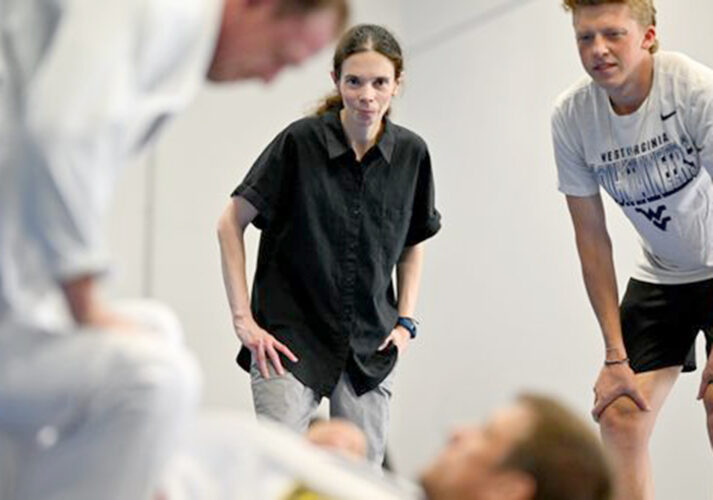
WVU photo WVU associate professor Janet Garcia and undergraduate student Luke Hallowell watch as instructors Ryan Leibrich and Tony Moenich of Renzo Gracie Jiu-Jitsu Studio demonstrate grappling positions. Garcia and Hallowell are community-based researchers who work with parents to study how children with autism and other neurodevelopmental disorders can benefit from judo and jiu-jitsu classes.
MORGANTOWN — At Renzo Gracie Jiu-Jitsu Studio in Morgantown, West Virginia University exercise physiologist and health psychologist Jeanette Garcia is teaching a jiu-jitsu class. She is joined by the director of Stepping Stones, a recreation center for people with disabilities, and a small group of West Virginia University students.
They are not practicing throws or chokes, nor are they studying how other people learn and execute those techniques.
They are supporting the participants – children with autism spectrum disorder and soon their parents and caregivers – and learning how both children and parents can benefit from practicing martial arts together as a family.
Garcia said what's already clear is that families who train together grow together and gain confidence, rest, relaxation and pure fun.
Garcia, now an associate professor in the Department of Sport Sciences in the College of Applied Human Sciences at West Virginia University, discovered his calling in promoting physical activity for youth and families affected by autism during his time as a postdoctoral researcher at the Harvard School of Public Health.
“I was doing a cycling activity with some kids with disabilities, where we were riding bikes and playing video games.” She said: “We found that the kids with autism were really into it. They enjoyed winning trophies and having friendly competition. We saw a lot of benefits beyond just increased physical activity.”
When Garcia left Harvard for the University of Central Florida and was approached by schools and community centers in Orlando looking to improve the athletic skills of young people with autism, he considered activities that incorporated the qualities the kids enjoyed about cycling games: structure, repetition and gradual, intermittent social interaction.
Martial arts like judo and jiu-jitsu fit the bill, with an emphasis on self-defense, mind-body connection and grappling rather than striking. In 2017, Garcia opened his first judo class for children with autism.
“And it was a mess.” She said: “I do community-based research.” — Participants, partners and researchers work together on an equal footing — “It was always chaotic, but we got better and have been doing at least one round a year ever since. I'm proud of how far we've come and that we're continuing this work through WVU.”
The classes now include young people with Down's syndrome and other neurodevelopmental disorders and, importantly, will now also include peer and family support.
“A while ago, I did a project to compare participation in judo classes where children attended alone with those where they attended with their parents.” She said: “I was worried that parents wouldn't want to do judo and that no one would sign up for the family group. I was completely wrong. Everyone wanted the family group and attendance improved dramatically. In private groups, parents often reported that if their child missed class, the family's schedule took priority. In family classes, the class was on the family's schedule and no one missed classes.”
Because parent involvement dramatically increased participation rates, Garcia decided to design the entire study around the benefits parents received from the sessions.
The study is in response to the fact that autism poses health risks not only to those with the disorder, but also to their caregivers. Children with autism are more likely to suffer from poor nutrition, sleep problems, and lack of exercise, while parents report higher levels of stress, which leads to unhealthy behaviors. And with an estimated 80% of autistic youth having sleep problems, caregivers often suffer from sleep problems as well.
photograph Self-care day It's not easy for parents of autistic children to make time to de-stress, and when they do, they often end up worrying extra about what's going on while they're away. But when parents attend judo classes with their kids, they sleep better and feel significantly less stressed, Garcia says.
“Parents reported that it was a great way to bond with their kids, they really enjoyed it, and they felt their kids were happier and more interacted.” Garcia said.
The children themselves report a dramatic increase in their self-confidence, and Garcia has found that some children with sensory disabilities are more open to being touched when wearing the uniform.
“I don't know if the judo uniform will be a protective layer for children, but I can see that children who don't want to touch anything get used to wearing the uniform and end up high-fiving each other. That's the point I want to study.”
Garcia didn’t have the opportunity to do research as an undergraduate, so she likes to involve students in her research projects.
“As an undergraduate, I didn't know that I could do research. I thought research always happened in a lab. So when I started teaching at West Virginia University in August 2023, I said to one of my classes, 'If anyone wants to learn about research, I'm thinking about starting a jiu-jitsu program.' I didn't get a huge response. In the end, I think I had two or three undergraduates who said they'd do it.” Garcia recalled.
“But once we got started, they were so excited. They had no idea the research would become like this. They started talking to other students, and the volunteers went from two or three to nine, then graduate students joined and it grew to 12 or 13. All told, we now have 20 volunteers. We have a one-to-one volunteer-to-participant ratio. The momentum is just building, and it's really wonderful for the volunteers to see how much the families are enjoying the program.” She said:
“At the end of the day, seeing parents smiling and kids hugging each other, that's why we do this.”

